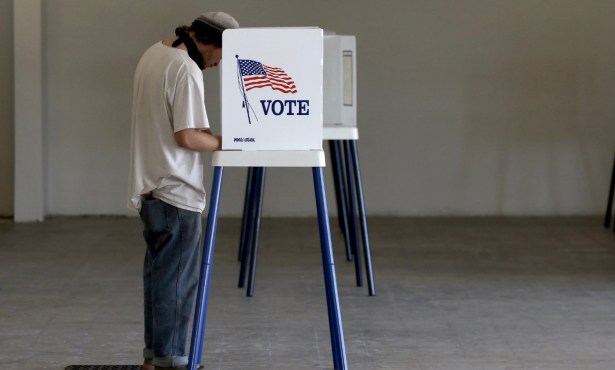When Good Doughghs (Dogs) Go Braugh (Anyone Know What a “Braugh” Is?)
Poodle Sings Off-Key Rendition of “Danny Boy”
It may be my peculiar way of honoring St. Patrick’s Day, but today I come to honor corruption, not to bury it. As America celebrates the day of the leprechaun and the four-leaf clover by slugging back a pint of Guinness — or six — and getting good and yammered, I’d like to remind you all of a few Irish-American factoids that actually may be more pertinent than the hangover you will soon be reeling from.

In this case, I’d like to sing the praises of Tammany Hall, one of the purest expressions of political corruption and venality this country has ever produced. Two points: First, as egregious as Tammany admittedly was (and as it’s detailed in Terry Golway’s new book on the old subject), it pales in comparison to today’s perfectly legal forms of political corruption. Under the rules of Tammany, one voted as one was told and got a job or services. In other words, there was a legitimate exchange of value. Today, I suppose it could be argued that an exchange of value still exists, but it’s strictly between the largest of corporations and those elected officials who write the tax codes and environmental regulations upon which corporate earnings rise and fall. Lost in the equation are all the useless brothers-in-law and dubious blood relatives who under the old system somehow managed to find work — or at least a paycheck.
The second point? Unlike Thomas Cahill’s notoriously skinny tome, How the Irish Saved Civilization, the contributions of Tammany Hall — though long dead and moldy — are of the ilk that most people could give a shite (Irish spelling) about. Cahill writes movingly about how the Irish monks of the Middle Ages saved the works of Aristotle and Socrates from the Huns, Goths, and Visigoths then plundering and pillaging as much of Europe as they could get their bloody hands on. Not to belittle, but when was the last time you, anyone you knew, or anyone within the seven degrees of separation spanning you and Kevin Bacon ever mentioned either of these two dead gentleman? To be fair, Socrates devised a surefire formula for annoying the shite (again, that would be Irish and thus permissible in a family paper) out of even the Dalai Lama by answering every question with a question of his own.
By contrast, the hoods and goons that ran New York City’s political machine Tammany Hall have left a far more tangible legacy. Tammany did not start out for, of, and by the Irish, but the ward healers and political sachems quickly figured out that the hordes of Irish who started flooding into America in the 1840s might be a good source of votes. The Irish of course came — two million out of a total population of eight million — because of the great famine. As the United States had not yet stolen Mexico, the Irish were tolerated because the cheap, reliable, and ever-deportable Mexican labor force had not yet been discovered. But everything nasty you ever heard said about the Mexicans was said about the Irish: dumb, lazy drunks who procreated all day long without a thought of taking care of the progeny, and spent their off hours getting into stupid fights and leaving a trail of blood as wide and thick as the River Liffey. (And although that’s where the Guinness comes from, you might not want to fall in it.) In newspaper articles and editorials, the Irish were frequently depicted as apes.
Overt time, the Irish and Tammany became interchangeable, and over time, the machine gave rise to many political superstars, not the least of which was Al Smith, who would serve four terms as New York governor in the 1920s and run for President in 1928. Smith was famous for having a big grin and an even bigger nose that was redder than Rudolf the Red-Nosed Reindeer’s. And though he didn’t make it, Smith was the first Catholic ever to run for president. It’s worth noting that Smith failed at a time when the Ku Klux Klan was at its hateful zenith, and back then the Klan hated Catholics even more than Jews and blacks.
Smith hired a woman named Frances Perkins as his Secretary of Labor, and among other horrors Perkins witnessed was a the Triangle Shirtwaist Factory Fire of 1911, in which 146 workers — all young women immigrants — were burned alive. With Perkins’s prodding, Smith would pass a slew of labor rights bills that far exceeded the immediate health and safety concerns brought to the fore by the fire. For example, New York State passed something akin to an unemployment insurance act back in the 1920s. It passed something akin to a minimum wage. It passed bills creating health insurance for workers and making sure workers injured on the job got paid for their troubles. Under Smith, teachers’ salaries increased, hospitals for the sane and insane were built, and efforts to give women the vote enacted. And to keep people from needing either type of hospital, it passed a law giving workers the unheard of luxury of a legally mandated day off.
Today, Smith is known only to history nerds as The Happy Warrior, the anti-prohibitionist Catholic with the big schnoz and rheumy eyes who ran for prez but went nowhere. Smith’s reform agenda, however, would not go nowhere. When Franklin Delano Roosevelt was elected President in 1932 and set about to save America’s ruling class from itself — much to their everlasting enmity — he borrowed and stole whole cloth from the legislative menu created by Smith. (To describe relations between the two as strained would be a kind understatement.)
To get to the point, if you get laid off and collect unemployment, it may not be the pot of gold that by law all leprechauns are required to turn over to anyone who manages to catch them. But you should stop and thank all those dirty, corrupt Irish-American ward heelers who shamelessly pimped the Irish immigrant vote for their own nefarious ends. Because without them, you’d be shite out of luck. And let me tell you, no amount of Guinness can wash that taste out of your mouth.
And by the way, happy St. Patrick’s Day.



